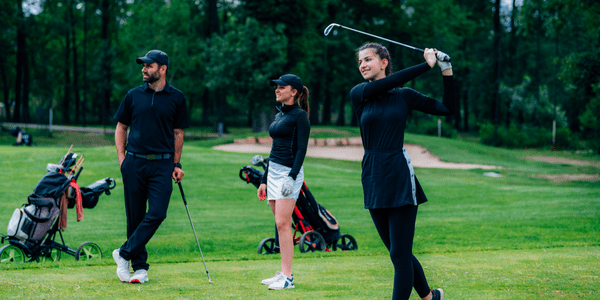
How Do You Respond on an Off Day?
Golf is a roller coaster of emotions, but does it have to be? Does a bad shot have to elicit frustration, anger, or anxiety?
It is impossible to play a round of golf where at least one ball doesn’t fly off course, land into a sand trap, break in the wrong direction, or stop short of the hole.
You play golf for the challenges. Sometimes those challenges are exciting, while other times, those challenges are maddening.
Emotions rise and fall as a result of your response to a shot. Therefore. emotional balance is a critical mental skill.
You have probably told yourself repeatedly, “If I could only stay calm after a bad shot, I would be such a better player.”
Even though you know staying calm is essential to shoot low scores, how much time do you spend developing the mental skill of emotional balance?
For most golfers, the answer is ZERO. Now is an excellent time to learn how to develop COMPOSURE.
Composure is your ability to balance your emotions and stay calm in challenging situations and bad shots.
Emotional balance is achieved through two mental skills: Maintaining perspective and regrouping.
1. Perspective — You can think of perspective as a preventative skill.
Golf is not an “all or nothing” sport. In other words, golf isn’t a game you either play great or you play horribly.
Every performance lies within a middle range. A few bad shots will not throw off your game. When you develop a realistic perspective, a few bad shots won’t send you into a tizzy.
One method of changing your perspective is to challenge your beliefs about your abilities and expectations on the golf course.
2. Regrouping — This is moving your attention from the past mistake back to the present moment.
The skill requires moving on from past shots and letting go of judging. This skill helps you minimize frustration, anger, and those negative emotions that interfere with playing your best golf.
Maddy Szeryk earned her LPGA Tour membership for the 2022 season at the LPGA Q-Series. Szeryk stayed emotionally balanced throughout the tournament which helped to achieve her goal.
SZERYK: “I think it’s a hard balance. It’s a weird mix with it being so many rounds. It’s like, okay, one bad hole in the long scene isn’t going to kill me. I’m just focusing on the so many good things that can come and just trying to have a quick turnaround and not be so angry. I think that’s what I did well today, I felt confident going in, and you just have to leave it all out there.”
Perspective is how you view your golf round and what happens on the course. If your perspective is to hit perfect shots, it’s harder to stay composed.
Try talking a long-term perspective with your game. How many holes will you play over a year? One hole should not matter with this perspective.
However, when you feel frustrated with your game, take a deep breath and give yourself a perspective chat.
A mental key to staying composed is to have more acceptance for being a human golfer–You can’t be Iron Byron!
Related Golf Psychology Articles
- How to Overcome Overthinking on the Golf Course
- Managing Anxiety for Winning Golf
- What is a Positive Attitude in Golf?
- Subscribe to The Golf Psychology Podcast on iTunes
- Subscribe to The Golf Psychology Podcast on Spotify
Golfers Mental Edge Program

“The Golfer’s Mental Edge 2.0” is new in 2021. This audio and workbook program helps you overcome a lack of focus, low self-confidence or other mental game obstacles on the course that prevent you from reaching your true potential in golf. Learn the secrets to better focus, confidence and composure that Junior, Collegiate and Tour Professionals use to WIN!